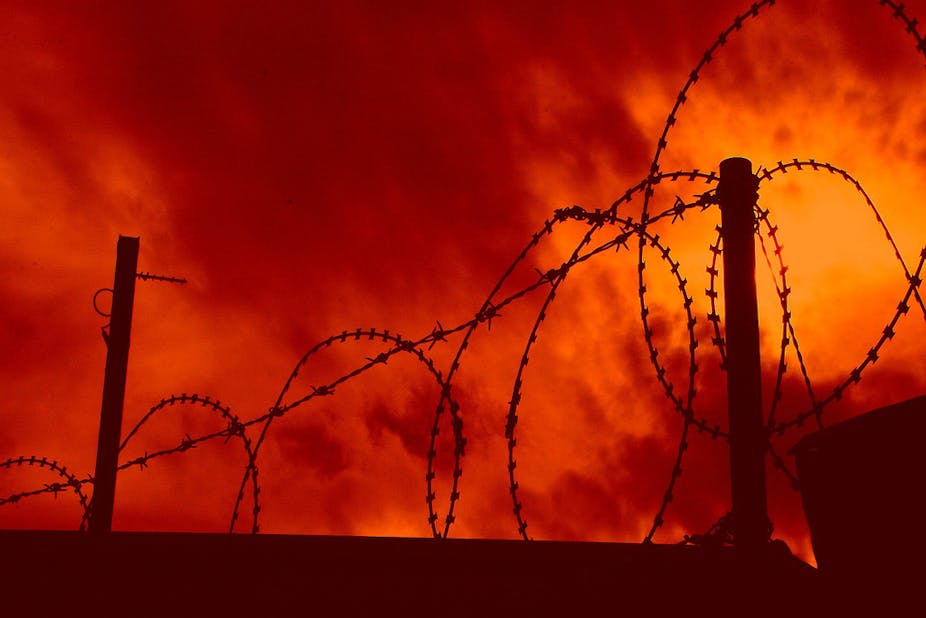The 1,000-plus children currently detained in immigration detention facilities in Australia and Nauru are at risk of serious mental health and developmental problems. The Human Rights Commission this week launched an inquiry into the potential harms suffered by these children, and those who were detained before them.
But while the need for a further inquiry into the detention of children is clear, its potential to bring about change is not; we’ve been here before.
In 2004, the Human Rights and Equal Opportunities Commission report A Last Resort documented the poor treatment of children and adolescents across the detention system. It found clear evidence of short- and long-term impacts on child development, well-being and mental health.
As someone who gave evidence to the inquiry based on my assessments of many children and families in closed detention centres, it seemed to promise reform and a greater commitment to child protection and children’s rights. So how is it that we’re here again?
Last time
The “first round” of immigration detention in the 2000s was typified by remote centres in Woomera and Baxter. Children were detained in harsh and deprived environments with limited facilities, activities or care. Children seen by child mental health specialists showed signs of developmental delay, attachment difficulties, anxiety and trauma-related conditions.
Those of us who went to the centres – all experienced clinicians – had seen these sorts of issues in extremely abused children. We struggled with the reality that the conditions of detention and the policy of mandatory detention directly contributed to these children’s mental deterioration.

This experience led to research into the factors contributing to mental disorder in detention and advocacy for the rights of vulnerable asylum seekers to appropriate levels of care and support in an attempt to prevent harm. Professionals began to see the opposition of such damaging policies as an ethical responsibility. And major medical colleges, the Australian Medical Association and other health groups got involved to support the rights of child asylum seekers to care and protection.
This lobbying was a significant factor leading to the first HREOC inquiry. It also led to broader reviews into the management of mental disorder in detention as typified by the case of Cornelia Rau, an Australian resident suffering from schizophrenia who was wrongly detained in immigration detention for ten months in 2004.
The series of reviews all pointed to the vulnerability of asylum seekers and the deterioration that comes with prolonged detention without hope in remote and harsh environments. The impacts on the very young are extreme; they are likely to suffer developmental problems with long-term consequences.
Those separated from their families experience grief and loss, which is compounded by the uncertainly of whether they’ll be reunited with their family: this is not an option currently with changes brought in by the Abbott government.
Sound advice
The HREOC report and research by child psychiatrists and mental health professionals provided a clear outline of the impact of detention on children. This was widely discussed and shaped some positive reforms in the “honeymoon” period of government openness to professionals having a consultancy role and input into policy reform.

The establishment of the Detention Health Advisory Group in 2006 and its follower the Immigration Health Advisory Group (IHAG) was an important step in formalising a process for expert advice on complex heath and mental health issues. It contributed to better screening and identification of mental health problems, approaches to reducing risk of mental deterioration and, importantly, advice about the mental health and well-being of children.
Significant numbers of family groups were placed in forms of community detention and the advisory groups continued to highlight the needs of children to education, activities and less restricted environments.
Of course, there is always tension inherent in a process of independent advice. The professional bodies have always opposed the detention of children, torture and trauma survivors and those with mental illness, and have consistently articulated this view over the last 15 years. But while government may choose not to act on advice, it can still be given in good faith.
The disbanding of IHAG in October 2013 raises concerns about lack of any independent expert advice on asylum seeker health and mental health and the willingness of government to have a degree of scrutiny around the impact of policy changes on asylum seekers.
Towards reform
Past failures cannot detract from the significance of documenting current abuses of children. It is shameful Australia has reverted to the conditions of a decade ago in the face of substantial evidence about the damage closed detention of children can produce.
We now face some major challenges: depression, despair and suicidal behaviour among young people on Christmas Island facing transport to Nauru; the government’s statements that there are “no exceptions” to transportation on the grounds of age, illness or mental disorder; a culture of limiting access to information about the welfare of children; and lack of any independent monitoring or review of detention centres are all major challenges.

The imperative is to seek information that will allow a review of the conditions of detention and the mental health and developmental outcomes for children. The challenge for a government wedded to remote processing and deterrence is to convince the community that damage to children is collateral damage in the “war” against asylum seekers and that the ends justify the means.
Without independent inquiries, this discussion will not occur and we are condemned to repeat past mistakes.

